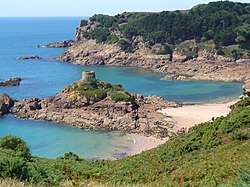St Brelade
Saint Brélade | |
|---|---|
 St. Brelade's coastline of promontories and bays includes Portelet and its tidal island, L'Île au Guerdain with Portelet Tower (also known as Janvrin's Tomb) | |
 Location of Saint Brélade in Jersey | |
| Crown Dependency | Jersey, Channel Islands |
| Government | |
| • Connétable | Steve Pallett |
| Area | |
| • Total | 12.8 km2 (4.9 sq mi) |
| • Rank | Ranked 2nd |
| Population (2011) | |
| • Total | 10,568 |
| • Density | 830/km2 (2,100/sq mi) |
| Time zone | GMT |
| • Summer (DST) | UTC+01 |
| Postcode district | |
| Postcode sector | 8 |
| Website | www |
Saint Brélade is one of the twelve parishes of Jersey. Its population was 10,568 as of 2011,[2] and it occupies the southwestern part of the island. It is the only parish to border only one other parish, St. Peter. The parish is the second-largest parish by surface area, covering 7,103 vergées (3,157 acres or 12.78 km²), which is 11% of the total land surface of the island.
History
Its name is derived from a 6th-century Celtic or Welsh "wandering saint" named Branwalator or Saint Brelade (also Branwallder, Broladre, Brelodre, Brélade), who is said to have been the son of the Cornish king, Kenen. He is also said to have been a disciple of Samson of Dol, and worked with this churchman in Cornwall and the Channel Islands. A large section of the Jersey Railway linking La Corbière with Saint Helier ran through the parish between 1870 and 1936.
Church

St Brelade's Church is situated at the end of St. Brélade's Bay, an unusual situation being comparatively distant from historic centres of population. The small Fisherman's Chapel alongside contains mediaeval frescoes which survived the iconoclasm of the Reformation. According to folklore, the reason for the siting of the parish church is that originally the St. Bréladais intended to build the church inland, much nearer to the homes of the congregation. However les p'tits faîtchieaux (the little people) who had their temple in a nearby dolmen were disturbed by the construction of the foundations and, every night, would undo the construction work and magically transport all the tools and materials down to the shoreline. Eventually the humans gave up and built the church where the fairies had indicated.
Another church is located close to the Parish Hall in Saint Aubin. St Aubin on the Hill is an Anglican church in the Parish of Saint Brelade dedicated to Saint Aubin of Angers. The church that stands today was built in the 19th century and is a fine example of Victorian Gothic style, with beautiful stained glass windows. When this was built the appointed minister of the Anglican church also supported the building of a local primary school just a short walk from the church. St Brelade's School served the whole parish until it closed in the 1984 and became St Brelade's College, a school that teaches English to foreign pupils.
Geography

St. Brélade has some of the most popular bays in Jersey, with St. Brélade's Bay, Ouaisné, Portelet and parts of both St. Ouen's Bay and St. Aubin's Bay falling within the parish boundaries. The village (or town) of Saint Aubin was originally a fishing port facing St. Helier on the opposite side of St. Aubin's Bay. St Aubin was historically the main centre of population in the parish, but residential development at Les Quennevais has shifted that centre of population.
Jersey's prison is situated at La Moye, and the island's desalination plant is also sited in the parish.
The lighthouse at La Corbière features on the Jersey £5 note (see Jersey pound) and the Jersey 20-pence piece (see coins of the Jersey pound)
The traditional nickname for St. Bréladais (inhabitants of St. Brelade) is carpéleuses (caterpillars).
Demographics
| Year | Pop. | ±% |
|---|---|---|
| 1991 | 9,331 | — |
| 1996 | 9,560 | +2.5% |
| 2001 | 10,134 | +6.0% |
| 2011 | 10,568 | +4.3% |
Subdivisions
The parish is divided into vingtaines for administrative purposes as follows:
St. Brélade is divided into two electoral districts:
- St. Brélade No. 1 district (Vingtaines de Noirmont and du Coin) elects one Deputy
- St. Brélade No. 2 district (Vingtaines des Quennevais and de la Moye) elects two Deputies.
Twin towns
St Brelade is twinned with:
Notable residents
- Isaac LeVesconte (12 August 1822 – 26 October 1879), Nova Scotia businessman and political figure.
- Steve Pallett was elected Connétable of the Parish of St Brélade in 2011.[3]
- Charles Robin
- Robert Pipon Marett, of La Haule Manor
- Claude Cahun
- André Gide
- Simon Laurens
- Derek Warwick, former British Formula One driver
- Ronald Price Hickman, car designer and inventor who designed the original Lotus Elan, the Lotus Elan +2 and the Lotus Europa, as well as the Black & Decker Workmate.
- Bob Murray (businessman) businessman and former chairman of Sunderland A.F.C. An accountant by trade, he made his fortune through the growth and sale of the Spring Ram kitchen manufacturing company.
- Jack Higgins, pseudonym of British novelist Harry Patterson, author of The Eagle Has Landed
- Jamie Lovatt, The Voice UK 2014 contestant
Awards
In 2009 the parish won a Britain in Bloom award in the small coastal resort category.[4] Britain in Bloom awards too in 2012, 2014 & 2015.
References
- ^ "St.Brelade Homepage". Parish.gov.je. Retrieved 4 October 2012.
- ^ Report on the 2011 Jersey Census Archived 1 March 2014 at the Wayback Machine
- ^ "Connétable - Stephen William Pallett". States of Jersey. Retrieved 29 March 2013.
- ^ "BBC News - St Brelade wins gold in Entente Florale Europe". Bbc.co.uk. 25 September 2010. Retrieved 7 October 2012.
- Jersey Folk Lore, John H. L'Amy, Jersey 1927

